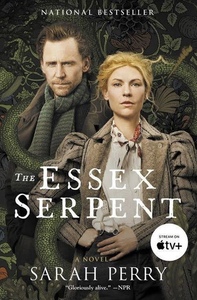Take a photo of a barcode or cover
Three weeks ago, as I was finishing L’Homme qui parlait la langue des serpents, something bright moved on the window sill: off drifted The Essex Serpent, to land on my lap, after ten months of watching the sun’s journey across the garden. That was three weeks ago indeed.
I have been making irregular progress with Sarah Perry’s second novel. Following an opening scene of pure vision, rhythm and sounds, the story unfolds in a rather expected fashion, threatening more than once to fall into Victorian clichés. It was pleasant enough to read – it seems that Perry has found a spring in her style, a merriment absent from her first, more melancholic novel. But for a good hundred pages I was seriously wondering why I was reading it. For the same reason, I suppose, that I read most texts: I am incapable of letting go. Once open, it has to be read, no matter how bad, how flat, how irrelevant, how boring and uninteresting. That’s why I never open any essay on business, economy or finance. That’s three weeks given to pen charlatans. Three weeks is a valuable period of time and has to be well spent.
So, I gave three weeks to Sarah Perry and I do not regret them. When it comes to writing she is no charlatan. Her language is as beautiful as ever. It has gained thickness and fineness, consistency and subtlety and has lost none of its music. In After Me Comes The Flood she was writing from her own head. In The Essex Serpent she grasps the world. She is on a journey from poet to writer. It is a fascinating journey to watch, one that raises many questions and opens many futures. I know nothing of Melmoth yet – but I am now curious.
Had it not been for my inability to leave books unfinished I would have dropped The Essex Serpent around page 100. But I didn’t. I carried on blindly, groping my way through three chapters of conventional scenes and expected dialogues and lo and behold – how did this happen ? – all of a sudden I was on page 200 and gripped. Queasiness and horror were oozing into the text: hypnotism, surgery and stabbing. Her vivid descriptions were getting me on the ropes (blades, scalpels and needles, sliced flesh, severed tendons, muscles hanging loose), feeling dizzy and weak like a teenage stoner having a whity. She was throwing her characters in the throes of their own feelings, mixing pain and pleasure with the confidence of a Sadist. The caricatures were gone. Science and religion, poverty and wealth, moral integrity and political pragmatism, all dancing around each other, seduction and betrayal, delusion and shame. As month by month the novel progresses, her style changes. With the weather it moves, from swift dialogues to pure poetry. The Essex Serpent is a jewelry box of mismatching treasures, neatly and tightly packed.
Of her first novel, I realize, I remember little. I remember it as a chant, as at that time she already possessed her wonderful instinct for rhythm and melody (which she might owe to a childhood spent listening to classical music). In The Essex Serpent, this rhythm is only found episodically. Sarah Perry must first serve her story. She does it well, even though the story contributes little to the book. But once it is served, once the characters are set and autonomous, she finally lets go. The tale starts moving in a different fashion: it is a succession of still shots retold in the present tense as if, in addition to music, Perry had a natural disposition for tainted glass. These are the central pages of the novel, from 250 to 300. They are magnificent.
I now understand better the support she receives from John Burnside. They both have the voice of naturalist mystics, a vision of nature through grace, of grace through nature, a voice I once found in the poetry of Yves Bonnefoy.
Some writers belong to the realist tradition, in that they write about our world. Nonetheless, they scarcely leave their own head. They are the Virginia Woolfs. Others paint an imaginary world and populate it with down-to-earth realities – and how we miss Terry Pratchett! Sarah Perry’s first novel belonged to the first category. The Essex Serpent is a commendable effort to write from our world. But she is a poet first and foremost. The musical instinct is strong with this one. Some will find it a shame. I don’t. I hope it grows stronger with her writing career.
I have been making irregular progress with Sarah Perry’s second novel. Following an opening scene of pure vision, rhythm and sounds, the story unfolds in a rather expected fashion, threatening more than once to fall into Victorian clichés. It was pleasant enough to read – it seems that Perry has found a spring in her style, a merriment absent from her first, more melancholic novel. But for a good hundred pages I was seriously wondering why I was reading it. For the same reason, I suppose, that I read most texts: I am incapable of letting go. Once open, it has to be read, no matter how bad, how flat, how irrelevant, how boring and uninteresting. That’s why I never open any essay on business, economy or finance. That’s three weeks given to pen charlatans. Three weeks is a valuable period of time and has to be well spent.
So, I gave three weeks to Sarah Perry and I do not regret them. When it comes to writing she is no charlatan. Her language is as beautiful as ever. It has gained thickness and fineness, consistency and subtlety and has lost none of its music. In After Me Comes The Flood she was writing from her own head. In The Essex Serpent she grasps the world. She is on a journey from poet to writer. It is a fascinating journey to watch, one that raises many questions and opens many futures. I know nothing of Melmoth yet – but I am now curious.
Had it not been for my inability to leave books unfinished I would have dropped The Essex Serpent around page 100. But I didn’t. I carried on blindly, groping my way through three chapters of conventional scenes and expected dialogues and lo and behold – how did this happen ? – all of a sudden I was on page 200 and gripped. Queasiness and horror were oozing into the text: hypnotism, surgery and stabbing. Her vivid descriptions were getting me on the ropes (blades, scalpels and needles, sliced flesh, severed tendons, muscles hanging loose), feeling dizzy and weak like a teenage stoner having a whity. She was throwing her characters in the throes of their own feelings, mixing pain and pleasure with the confidence of a Sadist. The caricatures were gone. Science and religion, poverty and wealth, moral integrity and political pragmatism, all dancing around each other, seduction and betrayal, delusion and shame. As month by month the novel progresses, her style changes. With the weather it moves, from swift dialogues to pure poetry. The Essex Serpent is a jewelry box of mismatching treasures, neatly and tightly packed.
Of her first novel, I realize, I remember little. I remember it as a chant, as at that time she already possessed her wonderful instinct for rhythm and melody (which she might owe to a childhood spent listening to classical music). In The Essex Serpent, this rhythm is only found episodically. Sarah Perry must first serve her story. She does it well, even though the story contributes little to the book. But once it is served, once the characters are set and autonomous, she finally lets go. The tale starts moving in a different fashion: it is a succession of still shots retold in the present tense as if, in addition to music, Perry had a natural disposition for tainted glass. These are the central pages of the novel, from 250 to 300. They are magnificent.
I now understand better the support she receives from John Burnside. They both have the voice of naturalist mystics, a vision of nature through grace, of grace through nature, a voice I once found in the poetry of Yves Bonnefoy.
Some writers belong to the realist tradition, in that they write about our world. Nonetheless, they scarcely leave their own head. They are the Virginia Woolfs. Others paint an imaginary world and populate it with down-to-earth realities – and how we miss Terry Pratchett! Sarah Perry’s first novel belonged to the first category. The Essex Serpent is a commendable effort to write from our world. But she is a poet first and foremost. The musical instinct is strong with this one. Some will find it a shame. I don’t. I hope it grows stronger with her writing career.
emotional
mysterious
reflective
medium-paced
Plot or Character Driven:
A mix
Strong character development:
Yes
Loveable characters:
Complicated
Diverse cast of characters:
No
Flaws of characters a main focus:
Yes
I did like this book and the poetic writing of it is beautiful. But its not a page turner and it meanders along like a slow river. Gathering small bits of random treasures along the way. In essence the book is about human relationships and what different things are felt and perceived by different people. I think for me the reason for the three stars is that I didn’t really warm to any of the characters and so i felt like i was just reading an essay of their lives, thats not to say that the observations of human fragility isn’t done well because it is but there just wasn’t much plot to it and so this was driven by characters who didn’t really do much other than exist which isn’t to say wasn’t interesting because it was, it was just that the synopsis promised so much more and i felt that it didn’t deliver on the Essex Serpent side of the title which was a side story in the end for me. I think it would be hard for me to sum this up and so I’m not going to, as like life you have to just pick this book up and see what unfolds along the way.
adventurous
inspiring
mysterious
reflective
sad
slow-paced
Plot or Character Driven:
A mix
Strong character development:
No
Loveable characters:
Yes
Diverse cast of characters:
Yes
Flaws of characters a main focus:
Yes
reflective
medium-paced
Plot or Character Driven:
A mix
Strong character development:
Yes
Loveable characters:
Yes
Diverse cast of characters:
No
Flaws of characters a main focus:
No
adventurous
dark
emotional
hopeful
mysterious
relaxing
sad
slow-paced
Plot or Character Driven:
A mix
Strong character development:
Yes
Loveable characters:
No
Diverse cast of characters:
No
Flaws of characters a main focus:
Yes
emotional
reflective
sad
medium-paced
Plot or Character Driven:
Character
Strong character development:
Yes
Loveable characters:
Yes
Flaws of characters a main focus:
Yes
Finishing this book took an act of self will I didn't realize I possessed.



